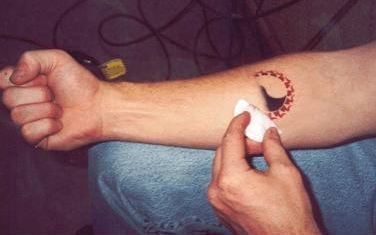How long do tattoos take to heal? That may be a query few people ask before getting a tattoo. In fact, it has to be the primary question that is requested earlier than you embark on such an adventure. Usually, its going to take among three to 4 weeks for a tattoo to heal, larger and deeper tattoos might take a slightly longer period to heal. Knowledge how long does a tattoo take to heal is essential because it guarantees that you keep away from skin infections or the lack of skin shade, troubles which are a grim reality for plenty people.

How lengthy do tattoos take to heal – 10 step system
Selecting a dependable tattoo artist is only the first step toward having a tattoo you could be pleased with. Information the tattoo healing procedure and understanding how long do tattoos take to heal is equally critical. Even the satisfactory tattoo paintings may be ruined via bad aftercare. Find the tattoo recuperation method explained in 10 steps below.
#1. On the point, a tattoo artist completes their task, the vicinity of pores and skin worked on is considered a wound. The artist will apply ointment around the place and follow a bandage. This is the beginning of the restoration method.
#2. Professionals are divided on the amount of time that a bandage have to cover a tattoo with some advocating a duration lasting some hours upwards to a few days. Youre required to explicitly observe your artists advice and your activity is to exchange the bandage to make sure that theres no buildup of microorganism.
#3. As healing progresses scabs start forming around the threshold of the tattoo, this is okay. Hold this region of the skin clean with the aid of running water thru, do no longer use a washcloth to wash the vicinity as this could similarly worsen the skin plus the fact that the cloth may additionally harbor microorganism.
#4. While drying the tattoo area make sure which you pat the pores and skin the use of a soft smooth towel. Desist from scrubbing the area for this will, in addition, worsen the skin.
#5. At some stage in the second week, after you have a tattoo, theres a sturdy urge to scratch the skin. Address this irritation by way of making use of moisturizers and antibacterial ointments. Dab just a bit of ointment due to the fact while too much ointment is applied, the tattoo is probably suffocated and this could encourage an invasion of bacteria onto the wound.
#6. The ointment you observe should not be a petroleum-based totally product. The purpose is that oil will draw ink from the tattoo to the surface of the skin which may make a tattoo fade even earlier than the shade settles in.
#7. The ‘wound need to be kept wet and making use of an ointment that is not oil based, scented or colored. If all of the above steps are accompanied religiously, the recuperation process needs to be 1/2 way accomplished in weeks.
#eight. By means of the 1/3 week the scabs might have fallen and it needs to be dry.
#9. After this nonetheless, there could be nonetheless useless pores and skin protecting over your tattoo. The tattoo doesnt appear as brilliant because it was to start with due to this overlaying.
#10. The lifeless skin also falls down and you get the actual look of your tattoo. Your tattoo is completely healed now.
To make sure top-rated recuperation of your tattoo, avoid the subsequent:
- Soaking your tattoo in a bath or a swimming pool. The motives are apparent, water attracts out the ink from the tattoo plus there is probably microorganism present within the water.
- Exposing the tattoo location to sunlight, UV rays can adjust the colors of the tattoo and cause the pores and skin to blister.
- Tight fitting garments around the tattoo vicinity, they aggravate the pores and skin floor and can precipitate an contamination of the ‘wound.
Overall, in a nutshell, with the above referred to ten step guide on the tattoo healing method you could get an idea of how long do tattoos take to heal. Also, it will likely be very good that you be privy to the health risks worried at some stage in the system and be prepared to guard yourself against infections.
